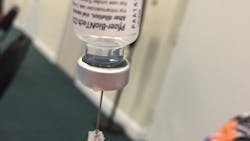Report highlights six month diminishing efficacy of mRNA COVID-19 vaccine
The efficacy of the BNT162b2 (COVID-19) vaccine developed by Pfizer and BioNTech declined from 96% to 84% over six months, according to an abstract released on MedRxiv, ahead of publication in a peer-reviewed journal. At the time of emergency use authorization, data beyond 2 months post-vaccination were unavailable.
Pfizer and BioNTech funded the study.
Vaccine efficacy (VE) peaked at 96.2% during the interval from 7 days up to 2 months after the second dose and declined gradually to 83.7% from 4 months post-dose 2 to the data cutoff.
Overall, VE against COVID-19 was 91% through 6 months of follow-up, among participants and irrespective of previous SARS-CoV-2 infection. VE of 86%‒100% was seen across countries and in populations with diverse characteristics of age, sex, race/ethnicity, and COVID-19 risk factors in participants without evidence of previous SARS-CoV-2 infection.
VE against severe disease was 97%. In South Africa, where the SARS-CoV-2 variant of concern, B.1.351 (Beta), was predominant, 100% VE was observed. Efficacy peaked at 96.2% during the interval from 7 days to 2 months post-dose 2 and declined gradually to 83.7% from 4 months post-dose 2 to the data cutoff, an average decline of 6% every 2 months.
In the ongoing, placebo-controlled, multinational, efficacy study, 44,165 people who were at least 16 years old and 2,264 participants between 12 and 15 years of age were randomized to receive 2 doses, 21 days apart, of the mRNA vaccines or placebo. Study endpoints reported are vaccine efficacy (VE) against laboratory-confirmed COVID-19 and safety data, both up to 6 months post-vaccination.

